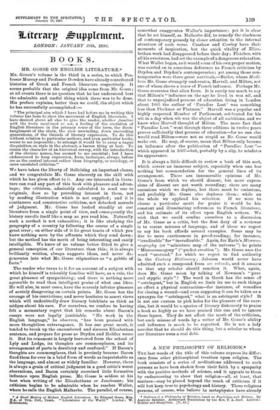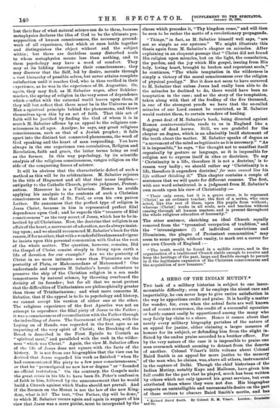A NEW PHILOSOPHY OF RELIGION.* THE last words of the
title of this volume express its differ- ence from other philosophical treatises upon religion. The book consists of a series of meditations addressed to such persons as have been shaken from their faith by a sympathy with the positive methods of science, and it appeals to them by endeavouring to show that religion—all, at least, that matters—may be placed beyond the reach of criticism if it will but keep true to psychology and history. Those religious persons, of course, who believe in metaphysics have already
• Outlines of a Philosophy of Religion, based on Psychology and History. By Auguste Sabatier. Authorised Translation by the Rey. T. A. Seed. London, Hodder and Stoughton. [7s. 6.1. lost their fear of what natural science can do to them, because metaphysics declares the idea of God to be the ultimate pre- supposition of human consciousness, the necessary ground- work of all experience, that which at once holds together and distinguishes the object without and the subject within ; but there are doubtless many disturbed souls to whom metaphysics means less than nothing, and to them psychology may have a word of comfort. They may at its bidding interrogate their consciousness ; they may discover that the Self, led by desire, mounts through a vast hierarchy of possible selves, but never attains complete satisfaction until it reaches God, who is thus verified in their ,,xperience, as he was in the experience of St. Augustine. Or, again, they may find, as M. Sabatier urges, after Schleier- macher, the spring of religion in the very sense of dependence which conflict with the external world leaves upon them, if they will hut reflect that there must be in the Universe as in Man a spiritual principle behind the phenomena, and throw themselves upon this by an act of faith. That this act of faith will be justified by finding the God of whom it is in search M. Sabatier affirms by an appeal to the religious con- sciousness in all ages. Analyse, he says, any great religious consciousness, such as that of a Jewish prophet ; it falls apart into the distinct but connected phenomena, the word of
God speaking and the heart of man responding. You have always in the one experience two correlatives, Religion and Revelation, faith and grace, the latter terms being as real as the former. In this way psychology, by its scientific analysis of the religions consciousness, ranges religion on the side of the conquering forces of science.
It will be obvious that the characteristic defect of such a method as this will be its arbitrariness. M. Sabatier rejoices
in the title of Huguenot and all that that name implies,—
antipathy to the Catholic Church, private judgment, Protest. autism. Moreover he is a Unitarian. Hence he avoids applying his analysis to the contents of such a Christian consciousness as that of St. Paul, or even his own patron Luther. He announces that the perfect type of religion is
Jesus Christ, because in him is represented perfect filial dependence upon God ; and be regards this "treasure of filial consciousness" as the very secret of Jesus, which has to be in- herited by all Christians. Now, the doctrine that religion is an affairof the heart, a movement of adoration, needs always insist- ing upon; and we should recommend M. Sabatier's book for this reason, if for no other, that with a wonderfulfreshness and vigour he insists upon this personal communion with God as the root of the whole matter. The question, however, remains, Did the Gospel of Christ consist simply in living upon earth a life of devotion for our example ? Are we the posterity of Christ in no more intimate sense than Platoniata are the posterity of Plato, or Mahommedans of Mahommed ? One understands and respects M. Sabatier's heroic adventure to preserve the ship of the Christian religion in a sea made tempestuous by natural science, by throwing overboard the divinity of its founder ; but for all that we must protest that the difficulties of Unitarianism are philosophically greater than those of Trinitarianism; and what more concerns M. Sabatier, that if the appeal is to lie to psychology and history, we cannot accept his version of either one or the other. The religious experience of the first Apostles was not an attempt to reproduce the filial piety of Jesus to the Father ; it was a consciousness of reconciliation with the Father through the indwelling of Jesus. The Sacrament of Baptism, with the Laying on of Hands, was regarded in the first ages as an imparting of the very spirit of Christ; the Breaking of the Bread is dem ibed in the First Epistle to Corinth as "spiritual meat," and paralleled with the rock in the wilder- ness "which was Christ." Again, the view M. Sabatier offers of the life of Jesus does not square with the facts of the history. It is not from our biographies that the view can be derived that Jesus regarded his work as finished "when He had communicated His piety to a few poor consciousnesses," or that he "promulgated no new law or dogma" or "founded no official institution." On the contrary, the Gospels make the great crisis in his life to have been St. Peter's confession of faith in him, followed by the announcement that be would build a Church against which Hades should not prevail. And if the Sermon on the Mount is not the law of the new King- dom, what is it ? The text, "Our Father, thy will be done," to which M. Sabatier recurs again and again in support of his view that Jesus was a mere pietist, must be interpreted by the
clause which precedes it, "Thy kingdom come," and will then be seen to be rather the motto of a revolutionary propaganda.
"Things," in fact, as M. Sabatier himself well says, "are not so simple as our systems." We might illustrate this thesis again from M. Sabatier's chapter on miracles. After explaining in an eloquent passage that "Christ did not found His religion upon miracles, but on the light, the consolation, the pardon, and the joy which His gospel, issuing from His holy, loving heart, brought to broken and repentant souls," he continues, "The whole temptation in the wilderness is simply a victory of the moral consciousness over the religion of physical prodigy." But it does not seem to have occurred to M. Sabatier that unless Jesus had really been able to do the miracles he declined to do, there would have been no temptation in the case; and so the story of the temptation, taken along with that of the feeding of the five thousand, is one of the strongest proofs we have that the so-called miracles of our Lord cannot be restricted, as M. Sabatier would restrict them, to certain wonders of healing.
A great deal of M. Sabatier's book, being directed against Roman controversialists, reads to us in England like a flogging of dead horses. Still, we are grateful for the chapter on dogma, which is an admirably lucid statement of the truth about the matter. M. Sabatier speaks of dogma as "a movement of the mind as legitimate as it is necessary." "As it is impossible," be says, "for thought not to manifest itself organically by gesture or language, so it is impossible for religion not to express itself in rites or doctrines. To say 'Christianity is a life, therefore it is not a doctrine,' is to reason very badly ; we should rather say 'Christianity is a life, therefore it engenders doctrine,' for man cannot live his life without thinking it." This chapter contains a couple of sentences that we will quote for different reasons. The first, with one word substituted, is a judgment from M. Sabatier's own mouth upon his view of Christianity :—
"Their only error, but it is a grave error, is to represent [Christ] as an ordinary teacher, the first of a series, who once acted, like the rest of them, upon His pupils from without; whereas [Christ] works in all souls, acts and teaches without ceasing through all human masters, and is present throughout the whole religious education of humanity."
The other sentence, sketching an ideal Church equally removed from the "tyrannical usurpation of tradition," and the " intransigeance (!) of individual convictions and Illuminism, the plague of Protestant communities," may seem to some people, without vanity, to mark out a career for our own Church of England :—
" The truth would be found in a middle course, and in the organisation of a traditional Church stable enough to receive and keep the heritage of the past, large and flexible enough to permit in it the legitimate expansion of the Christian consciousness and the acquisition of new treasure."



















































 Previous page
Previous page